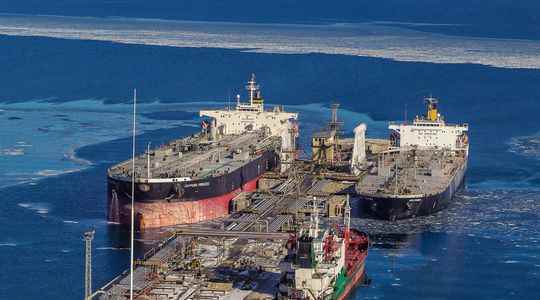kyiv has won the battle of the European oil embargo, supposed to dry up the financing of Moscow’s “war machine”. The 27 member countries of the European Union agreed overnight from Monday to Tuesday on a progressive embargo on Russian oil. This will initially concern oil transported by boat, ie two-thirds of European purchases of Russian black gold. A temporary exemption has been provided for oil transported by pipeline, in order to lift Budapest’s veto.
“This will cut off a huge source of funding for Russia’s war machine,” European Council President Charles Michel tweeted. The extension of the embargo to deliveries by pipeline will then be discussed “as soon as possible” and, in total, 90% of Russian oil exports to the EU will be stopped by the end of the year, said European Commission President Ursula von der Leyen and French President Emmanuel Macron.
Ukrainian President Volodymyr Zelensky had earlier challenged the Europeans on their need to stand up to Moscow, in a video message broadcast during the extraordinary summit in Brussels.
“The key point of course is oil. Europe will have to give up Russian oil. Because the very independence of Europeans from the Russian energy weapon is at stake”, he said. he commented on Monday evening in his daily address to his compatriots, even before the news from Brussels broke. This sixth package of European sanctions also includes the exclusion of three Russian banks of the Swift international financial systemincluding Sberbank, the country’s main institution.
- Nine billion euros for Ukraine, Swift, food crisis…
European leaders also approved on Monday evening the granting of 9 billion euros to the Ukrainian government to cover its immediate cash needs to keep its economy running. The second and last day of the summit must also address on Tuesday the continent’s energy transition to do without Russian gas, and the food crisis linked to the war in Ukraine which threatens the African continent in particular.
Russian President Vladimir Putin told his Turkish counterpart Recep Tayyip Erdogan in a telephone conversation on Monday that Russia was ready to work with Turkey on the free movement of goods in the Black Sea, including “the export of grain from Ukrainian ports,” according to a Kremlin statement.
Ukraine and Western countries accuse Moscow of blocking Ukrainian Black Sea ports, which Russian officials deny.
- Russian forces step up pressure in Donbass
Russian forces are advancing in the east of the country. They confront the Ukrainian forces in the heart of Severodonetsk, which with Lyssytchansk is a key city in the parts of Donbass still under Ukrainian control.
The Russian army has been trying to encircle Severodonetsk and take control of it for several weeks, in an offensive that has intensified in recent days, in the face of which President Zelensky admitted that the Ukrainian army was in difficulty.
“The situation in the Donbass remains extremely difficult. The Russian army is trying to concentrate its forces there to put more and more pressure on our defenders,” President Zelensky said Monday evening. “On the Donetsk side, the enemy is attacking our troops with mortars, artillery and grenade launchers along the front line. Efforts are focused on taking control of Severodonetsk,” summarizes the first point on Tuesday. morning of the Ukrainian army.
Russian forces aim to control the Donbass mining basin, which pro-Russian separatist forces backed by Moscow took partial control in 2014. Ukrainian forces nevertheless claimed to be regaining ground in the south, particularly in the region around Kherson, a city close to Crimea, which came under Russian control in early March.
“The enemy left the village of Mykolaivka, in the north of the Kherson region”, says a bulletin from the Ukrainian army published overnight from Monday to Tuesday, referring to the departure in “panic” of “demoralized” Russian soldiers “.
